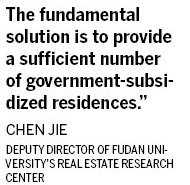Migrants have access to public housing units
Updated: 2011-07-14 13:29
By Wang Ying and Cao Yin (China Daily)
|
|||||||||||
SHANGHAI/BEIJING - Migrant workers with low incomes can apply to live in cheap public housing in Shanghai as part of city officials plan to help them cope with the increasing cost of rent, officials announced on Wednesday.
During the next five years, the Shanghai government will build more low-rent residences, said Pang Yuan, deputy director of the city's housing security and management bureau. He said migrant workers and other people without hukou, or permanent residence permits, will be able to move into them.
And starting in October, Shanghai plans to perform more thorough checks of apartments in which single rooms are rented out as separate units, an arrangement that is often popular among migrant workers. The campaign comes in response to concerns about what is perceived to be a lack of safety and security in such places.
|
|
 |
 |
The Ministry of Housing and Urban-Rural Development and the National Development and Reform Commission are now in the midst of a campaign to regulate the nation's property market, in part by more strictly overseeing property agencies, presales of commercial properties and the leasing market.
Still, figures from the National Bureau of Statistics show the average cost of housing rent in China in June was 5.9 percent above what it had been a year ago. That places a considerably heavier burden on renters and fuels concerns that inflationary pressures will continue to mount.
"First- and second-tier cities are the main contributors to the rent increases, which are driven by the housing demands of fresh graduates and migrant workers who come into big cities for jobs," said Hui Jianqiang, research director of Beijing Zhongfangyanxie Technology Service, which provides information about real estate markets.
In Shanghai, the average rent charged in June was 6.03 percent higher that what had been a year ago and 0.6 percent higher than in the previous month, according to ehomeday.com Ltd, a local property information provider.
Zhang Yue, director of the market research department of Homelink, a property agency in Beijing, said the average monthly rent for an apartment in June was about 3,100 yuan ($479), about 10 percent higher than it had been a year ago.
Zhang He, a resident from Central China's Hunan province who works in a company in the Zhongguancun technology hub in Beijing's Haidian district, told China Daily that it has become increasingly more difficult to afford living in the city.
Zhang had previously paid 3,800 yuan a month to rent a 110-square-meter apartment with decent indoor decorations and home appliances. Now, though, he can hardly rent an 80-sq-m house, he said.
According to Hui, an influx of recent graduates into the local housing market in the next couple of months will push the cost of renting even higher.
In early June, Chen Xing, who just graduated from a Shanghai university, and his two classmates found a two-bedroom apartment near their university for rent for 2,500 yuan a month. By the end of June, the cost of leasing a similar place had increased to 2,800 yuan a month.
The average rents charged in places near Shanghai's universities increased by about 10 percent in June, according to the Oriental Morning Post, a regional newspaper.
Song Huiyong, director of the research and consultive department of Shanghai Centaline Property Agency, a Hong Kong-based brokerage chain, said if the government would impose heavy taxes on every apartment that is left vacant, the owners of such places would find they have a strong incentive to find tenants. That would help to increase the supply of apartments and, consequently, decrease the cost of rent.
"The fundamental solution is to provide a sufficient number of government-subsidized residences," said Chen Jie, deputy director of Fudan University's Real Estate Research Center.
Shanghai Mayor Han Zheng said on Monday that the city will try in the second half of the year to cap the prices of residences recently built in two parts of Pudong New Area, a district in Shanghai, according to Xinhua News Agency. Han said the city will also experiment with at first leasing government-subsidized houses and selling them later.
Wu Yiyao contributed to this story.
